-
 A Party without the Right Decor is Hardly a Party: 5 Home Decor Ideas for Birthdays and 10 Party Props to Buy Online (2020)
A Party without the Right Decor is Hardly a Party: 5 Home Decor Ideas for Birthdays and 10 Party Props to Buy Online (2020)
-
 Moving to a New Home or Renovating? Your Guide to Home Decor Lights and How to Make Your Home Look Elegant and Stylish with Lighting (2020)
Moving to a New Home or Renovating? Your Guide to Home Decor Lights and How to Make Your Home Look Elegant and Stylish with Lighting (2020)
-
 Spruce Up Your Home Through Attractive Decor: 10 Elegant Home Decor Items on Amazon You Can Order Right Away! (2020)
Spruce Up Your Home Through Attractive Decor: 10 Elegant Home Decor Items on Amazon You Can Order Right Away! (2020)
Protecting Nature and Improving Lives

The recent pandemic brought a lot of heartbreak and uncertainty in the world but there is one thing it taught us which is super beneficial for us and for our coming generations. It is to cherish our nature and to take care of the environment. It was seen around the world how a couple of months of lockdown brought pollution down and the wildlife back in open, this surely proves that we as humans have caused a lot of damage to the environment just for our benefit.
It is high time that we realize that taking care of our nature and mother Earth will bring us a lot of joy, prosperity and health. There are people who are not only thinking about it but have taken that first leap and are doing wonderfully well. They are creating an impact and bringing a change in the environment as well as in the community. One of such people are Sunita Suhas and Suhas Ramegowda, and this is the story of their journey from leading a corporate life to reaching where they wanted to be and are making ripples.
The Inspiration Behind a Socially Conscious Company
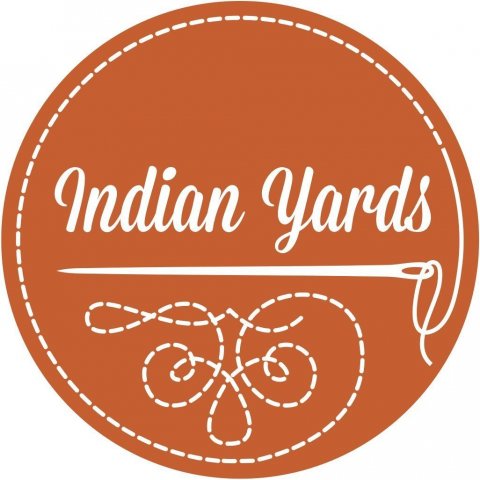
If you are one of those people who want to contribute to making the Earth a better place but don't know where to start then you are on the right page. We are talking about the Indian Yards. This is a company founded by Sunita Suhas, Founder, CEO and Suhas Ramegowda, COO and is situated amidst beautiful Nilgiris hills.
The couple packed their bags after leading a successful urban life and moved to the mountains in search of peace and found what they loved the most. They started out with farming with the help of the locals and soon opened their doors for the tribal women to teach them working with hands using natural cotton which gave birth to the Indian Yards.
Working with a Vision: Bettering Lives with Grassroot Effort
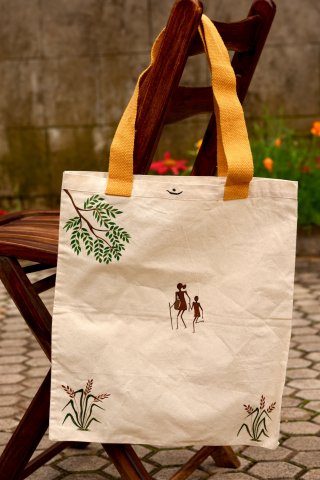
The Indian Yards aims to work with women in their area and enhance their skills. They teach women to be fine crafters using cotton fabric and yarn. They create masterpieces by hand which includes home decor, kitchen and macrame products. Their objective is to reach out to at least 5000 women by the end of 2022. These women with Indian Yard's guidance produce excellent patchwork cotton quilts, cotton bags, aprons and reusable cotton face masks. They are right now working towards building a strong macrame portfolio.
Other than that the Indian Yards are running AGAI, a livelihood program designed for women from the rural and tribal communities of the Nilgiris. They focus not only on livelihood but provide a platform for these women to come together to learn and share their experiences to grow together.
We realised that the “better” quality of life that we were looking for wasn’t limited to just OUR quality of life but for the larger community too. We realised that there are a lot of women who just need that extra nudge and the platform to express themselves.
Sunita Suhas and Suhas Ramegowda, Founders, Indian Yards
Q & A with Sunita Suhas and Suhas Ramegowda
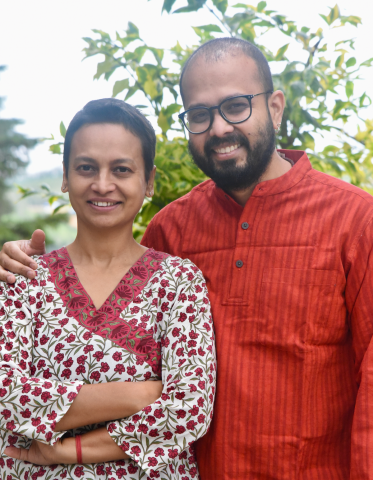
- Q. Tell us about your background.
- We used to be typical urban dwellers but events in life led us to believe that there was more to do with our lives than the corporate rat race and materialistic living. During this time we did a 2 month road trip across India covering 14 states and 14000+ kms in our car along with our son who was being unschooled and was 8 years old.
It was an unplanned, on-the-go road trip so we were very fortunate with some deep experiences. We spent most of these 2 months amongst rural India. The simplicity of people in rural India inspired us and we had a feeling that’s where we want to spend the rest of our life, and want our son to grow up. We knew we had gathered some skills and wanted to use those skills and do something special.
- Q. How did Indian Yards come to be?
- After wrapping up our lives in the cities, we moved to the blue mountains - The Nilgiris in search of a better quality of life. We bought a piece of forest, did farming, built an earth house, worked in the fields, listened to the elephants trumpet, bears growl. During this time, we realised that the “better” quality of life that we were looking for wasn’t limited to just OUR quality of life but for the larger community too. We realised that there are a lot of women who just need that extra nudge and the platform to express themselves. That's when Indian Yards came in. I had the skill to sew and teach, between me & my husband, we had the skills to run an enterprise that could provide a platform to generate livelihood.
- Q. How are the products of India Yards different from any other textile brand?
- We keep ‘sustainability’ as the guiding parameter through the design process of each of our products. The products we make are functional - no frills. The materials and method used to make the product is sustainable. For example, we use 100% cotton fabric and 100% cotton cords to make our cotton drawstring bags / pouches. The material is also sourced locally so reduces miles on them thereby reducing their carbon footprint. They are handmade. Their sales empower women and provide livelihood to a community. For our macrame products, we use recycled 100% cotton yarn.
- Q. How do you ensure quality of products?
- Once the women deposit the products they have made, a separate team scrutinises each product based on a defined set of instructions. Products that don’t make it past the quality check are handed back to the respective women to fix / rectify / take back depending on the severity of the defect. Sunita further scrutinises on a sample basis. After which the products are sent to inventory. There is another round of quality check done before dispatching to the customer. So quality checks happens twice. If we see that a particular maker is producing defects then the person is called back to the centre for further training.
Product Showcase: Innovative Cotton Products from Indian Yards
Striking Macrame Wall Hanging Shelf
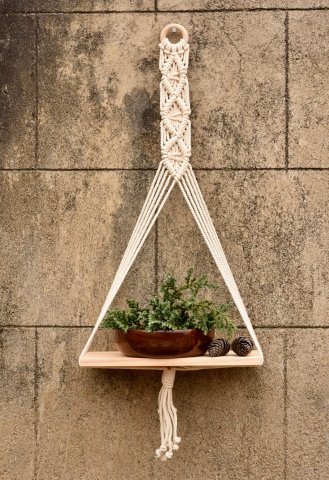
One of the many beautiful pieces made in Indian Yards is the Macrame wall hanging shelf. The wall hanging is made with recycled cotton yarn and is handcrafted by the local people attached to them. The product is beautifully women with intricate design on it yet is super soft and durable. The rings used on the hanging are made of strong maple wood which enhances its beauty. You can use it to hand your pots, planters or even books and make your home look very stylish. The price of this macrame wall hanging shelf is Rs. 545.
Convenient Macrame Hanger
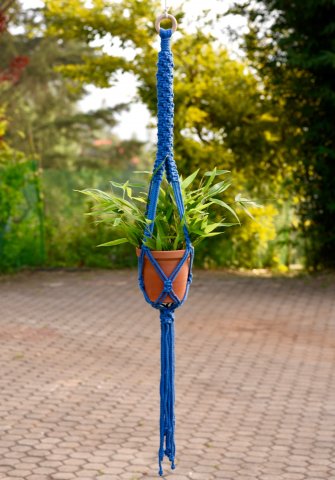
Another beautiful piece from the Indian Yards is the Macrame hanger for plants and fruit baskets. This macrame hanger is manufactured and sourced from local suppliers. This piece can be used inside or outside the house to hand either planters or fruit baskets. You can buy it in six different colours and can use it as a special gift for your friends and family. The hanger is made with cotton cords which makes it very soft and flexible. It can be washed easily and used for months without getting damaged. This macrame hanger costs Rs. 695.
Macrame Yoga Mat Straps
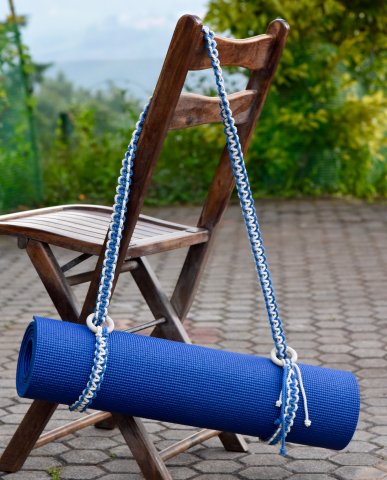
If you are into yoga and like to carry your yoga mat with you but usually can't because it is a hassle don't fret because now you can freely carry your yoga mat with you with the help of these beautiful macrame yoga mat straps. These yoga mat straps are made from recycled cotton yarn and are woven into perfection using cotton strings and maple wood rings. They look extremely cool and you can use them as Pilates strap, sport mat straps as well. They make a great gift for your eco-friendly friends on their birthdays as well. These yoga mat straps come in a range of between Rs. 450 and 499 which makes them very affordable. Check them out on their site.
Where Can You Find Them?
https://indianyards.in/Choosing A New Path: Challenges Indian Yards Faced
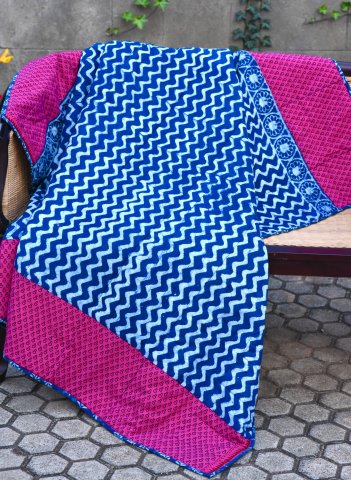
- 10. Tell us about your own interests.
- We also happen to be certified Hatha Yoga teachers so yogic ways of life is something that’s important to us. We enjoy our daily walks in the woods, it helps us stay centered irrespective of how the day has panned out. We work approx. 18 hours a day so left with very little time to dabble with anything else. Indian Yards needs every bit of our attention now and for a few years to come. If we aren’t working on a weekend then Sunita spends time tending to her plants / garden.
- Q. What are some challenges you face?
- We are first generation entrepreneurs and with minimal or no guidance from folks who have already walked this path. So some things we have taken inspiration from books, world wide web or our own wisdom while in most cases we tend to learn the harder way. Identifying new markets, reaching more customers, fine tuning our business model to make it more efficient have been some of the key challenges apart from of course access to funds when we need them the most.
A Committment to Improving Lives of Rural Women
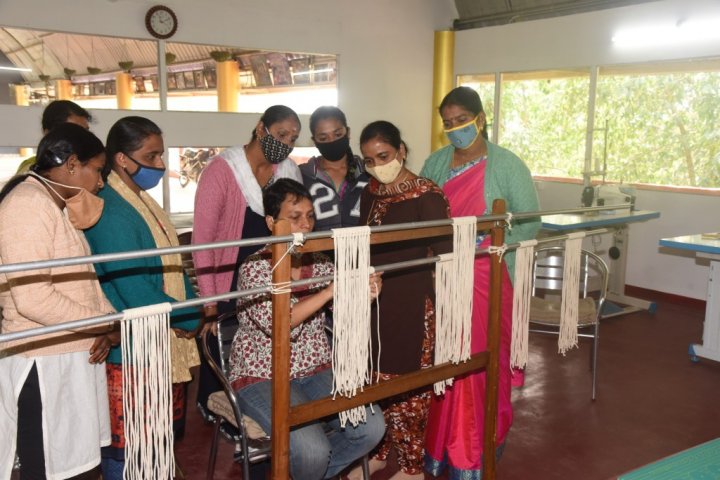
- Q. Why did you choose to move to the Nilgiris?
- Suhas grew up in Mysore and the Nilgiris was always part of the weekend getaway plan while we lived in Bangalore. These mountains had grown on us so it was a natural choice after wrapping up our lives in the cities.
- Q. Do you have a background in textiles?
- Sunita always had a fascination towards sewing and handcraft so during her maternity break, she explored and found a deep interest in working with cotton fabric. She is completely self taught, a first generation textile entrepreneur. She also believes that there's a maker hidden in every woman who’s comfortable with needle and thread. So when we decided to do something involving women, it was necessary to start with something that they are comfortable with - which is sewing.
- Q. Your website mentions you realised that women in your community were looking to do more. Any incident in particular that led to this discovery?
- The time we spent in the forest, we became part of a community comprising an indigenous tribe called Irulas that lived around us, one the many tribes in the region. The men folk head out everyday to either work in their own farms or as day labourers in other farms. The women folk, after completing their tasks for the day, are seen sitting around their settlements. Many of them expressed that their economic conditions weren’t stable and they’d like to help their men folk but didn’t know how. The only choice they previously had, of course, was picking tea leaves which was a seasonal event.
- Q. What is your process - of employing these women, and for deciding on the kinds of products that will be made?
- We have been operating here for around 2 years now so the word has spread about what we do. We have women visiting our centre every week asking for work / help. When we have a batch, we provide them training on products we are making. We also have relationships with various NGOs in the region who guide women to us if they are looking for work. The only criteria we have is the willingness to learn. We have seen that if they really need the work then they make the effort to learn. Commitment to work also comes naturally. We already have a range of products that are established and women get allocated to products basis their interests and capability. All our products are designed keeping in mind that they would be made by women at their homes on their basic machines / their hands so simplicity is kept at the fore. Once trained, they are handed over (required) material. They come back to the centre to deposit the finished product. We pay them on a monthly basis for the products they have been able to make in the month.
- Q. Do you provide training for the making of the products, and are you personally involved with production?
- Yes, Sunita is personally involved in training and different aspects of production. We provide specific training required to make specific products. Sometimes it is Sunita herself, but we have built a core team that also trains.
Future Plans and Ambitions?
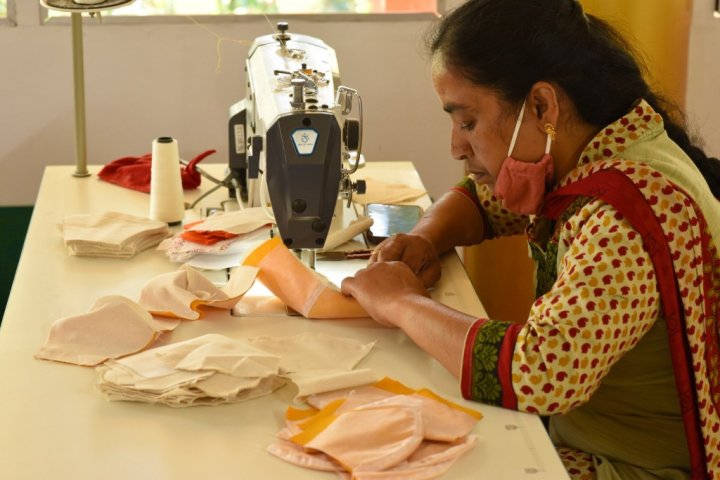
- Q. What’s next for you and for Indian Yards?
- We believe our venture into Macrame is something to look out for. We are heavily invested into this art form. Its a 100% handwork so women don’t need anything else part from a pair of hands to create some stunning pieces. The possibilities are also unlimited with macrame - one can knot a keychain or a cushion cover or a curtain or a cradle. Practically anything can be made using macrame and that excites us. The fact that this doesn’t need women to have access to machines means that we can reach out to a wider pool of women who are in need. Our goal of impacting 5000 women across the Nilgiris by end of 2022 seems getable with macrame.
-
 The Elegance of Cotton Sarees is Evergreen: 10 Different Types Of Cotton Saree You Must Have in Your Wardrobe (2020)
The Elegance of Cotton Sarees is Evergreen: 10 Different Types Of Cotton Saree You Must Have in Your Wardrobe (2020)
-
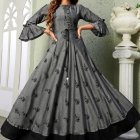 Wondering What to Wear To the Next Party? You Can Now Choose from These Top 10 Kurtis That Can Carry You Style Quotient to The Next Level!
Wondering What to Wear To the Next Party? You Can Now Choose from These Top 10 Kurtis That Can Carry You Style Quotient to The Next Level!
-
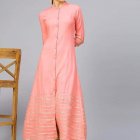 Long Kurtis Can Be Statement Pieces If You Know How to Style Them Properly! 10 Amazing Long Kurti Designs and How to Style Them in Different Ways (2020)
Long Kurtis Can Be Statement Pieces If You Know How to Style Them Properly! 10 Amazing Long Kurti Designs and How to Style Them in Different Ways (2020)
-
 Rock the Latest Lehenga Trends: 10 Stylish Saree Lehenga Recommendations for a Scintillating Look (2020)
Rock the Latest Lehenga Trends: 10 Stylish Saree Lehenga Recommendations for a Scintillating Look (2020)
-
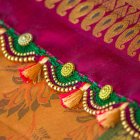 What is Saree Kuchu and How to Find the Perfect Saree Kuchu. 10 Must-Have Designs and Why You Should Use Them (2020)
What is Saree Kuchu and How to Find the Perfect Saree Kuchu. 10 Must-Have Designs and Why You Should Use Them (2020)

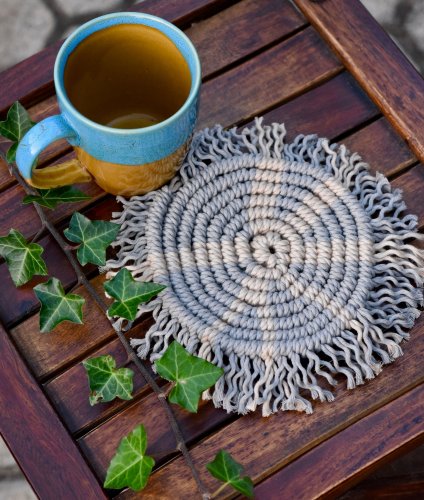
 Highlight the Best Facets of Your Incomparable Beauty: Discover the Best Face Highlighter Currently Available in India and Everything You Need to Know About Using Face Highlighters for Maximum Effect (2023)
Highlight the Best Facets of Your Incomparable Beauty: Discover the Best Face Highlighter Currently Available in India and Everything You Need to Know About Using Face Highlighters for Maximum Effect (2023)
 Forget the Blemishes and Get that Picture Perfect Flawless Radiance on Your Face: Check out the Best Foundations for Oily Skin Currently Available in India and Everything You Need to Know About Makeup Foundations (2023)
Forget the Blemishes and Get that Picture Perfect Flawless Radiance on Your Face: Check out the Best Foundations for Oily Skin Currently Available in India and Everything You Need to Know About Makeup Foundations (2023)
 Make Your Presence Felt Wherever You Go: Discover the Best Perfumes Under 2000 for Both Men and Women to Announce Your Arrival and Make Any Occasion Memorable (2023)
Make Your Presence Felt Wherever You Go: Discover the Best Perfumes Under 2000 for Both Men and Women to Announce Your Arrival and Make Any Occasion Memorable (2023)
 Protect Your Oily Skin from the Harmful Rays of the Sun: Discover the Best Gel Based Sunscreens for Oily Skin and Everything You Need to Know Before Buying One (2023)
Protect Your Oily Skin from the Harmful Rays of the Sun: Discover the Best Gel Based Sunscreens for Oily Skin and Everything You Need to Know Before Buying One (2023)
 Minor Blemishes and Wrinkles Affecting Your Confidence? Check out the Best BB Creams to Conceal Your Worries and Nourish Your Skin to Restore the Healthy, Radiant and Glowing Complexion Back Again (2023)
Minor Blemishes and Wrinkles Affecting Your Confidence? Check out the Best BB Creams to Conceal Your Worries and Nourish Your Skin to Restore the Healthy, Radiant and Glowing Complexion Back Again (2023)
